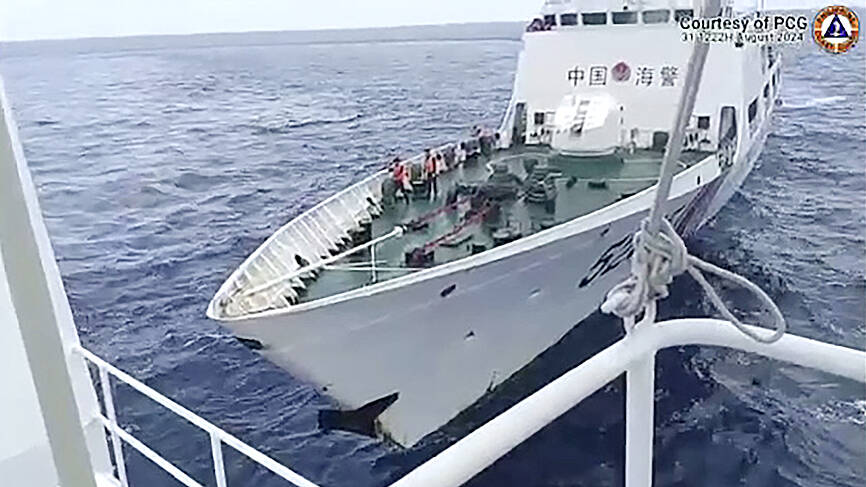The Philippines and China yesterday exchanged accusations of intentionally ramming coast guard vessels in disputed waters of the South China Sea, while separately, Japan accused Beijing of intruding into its territorial waters.
The collision near Sabina Shoal (Sianbin Shoal, 仙濱暗吵) in the Spratly Islands (Nansha Islands, 南沙群島) — which Taiwan also claims — was the fifth maritime confrontation in a month between Beijing and Manila.
Philippine Coast Guard spokesman Commodore Jay Tarriela showed videos of yesterday’s confrontation at a news conference, saying that China Coast Guard vessel 5205 “directly and intentionally rammed the Philippine vessel” without provocation.

Photo: AFP / Philippine Coast Guard
The ramming damaged the 97m Teresa Magbanua, one of the Philippines’ largest coast guard cutters, but no personnel were injured, Tarriela said.
China Coast Guard spokesman Liu Dejun (劉德軍) said in a statement that a Philippine ship, “illegally stranded” at the shoal, had lifted anchor and “deliberately rammed” a Chinese vessel.
He called on the Philippines to withdraw immediately or bear the consequences.
“The Chinese coast guard will take the measures required to resolutely thwart all acts of provocation, nuisance and infringement and resolutely safeguard the country’s territorial sovereignty and maritime rights and interests,” Liu said.
Tarriela said that Manila would not withdraw its ship “despite the harassment, the bullying activities and escalatory action of the Chinese coast guard.”
The Philippines deployed a ship in April to Sabina Shoal, which is about 140km from the Philippine province of Palawan.
Manila accused Beijing of building an artificial island, saying it had documented piles of dead and crushed coral on the sandbars, which Beijing denies.
Separately, a Chinese People’s Liberation Army Navy survey vessel briefly entered Japanese territorial waters, the Japanese Ministry of Defense said.
The ship was detected in Japanese territory off Kagoshima Prefecture at about 6am and had departed by 7:53am, the ministry said on its Web site.
It was the 10th time over the past year that a Chinese navy survey ship has sailed through Japan’s territorial waters, and the 13th time if submarines and intelligence-gathering vessels are included, national broadcaster NHK reported.

EUROPEAN TARGETS: The planned Munich center would support TSMC’s European customers to design high-performance, energy-efficient chips, an executive said Taiwan Semiconductor Manufacturing Co (TSMC, 台積電), the world’s largest contract chipmaker, yesterday said that it plans to launch a new research-and-development (R&D) center in Munich, Germany, next quarter to assist customers with chip design. TSMC Europe president Paul de Bot made the announcement during a technology symposium in Amsterdam on Tuesday, the chipmaker said. The new Munich center would be the firm’s first chip designing center in Europe, it said. The chipmaker has set up a major R&D center at its base of operations in Hsinchu and plans to create a new one in the US to provide services for major US customers,

The Ministry of Transportation and Communications yesterday said that it would redesign the written portion of the driver’s license exam to make it more rigorous. “We hope that the exam can assess drivers’ understanding of traffic rules, particularly those who take the driver’s license test for the first time. In the past, drivers only needed to cram a book of test questions to pass the written exam,” Minister of Transportation and Communications Chen Shih-kai (陳世凱) told a news conference at the Taoyuan Motor Vehicle Office. “In the future, they would not be able to pass the test unless they study traffic regulations

GAINING STEAM: The scheme initially failed to gather much attention, with only 188 cards issued in its first year, but gained popularity amid the COVID-19 pandemic Applications for the Employment Gold Card have increased in the past few years, with the card having been issued to a total of 13,191 people from 101 countries since its introduction in 2018, the National Development Council (NDC) said yesterday. Those who have received the card have included celebrities, such as former NBA star Dwight Howard and Australian-South Korean cheerleader Dahye Lee, the NDC said. The four-in-one Employment Gold Card combines a work permit, resident visa, Alien Resident Certificate (ARC) and re-entry permit. It was first introduced in February 2018 through the Act Governing Recruitment and Employment of Foreign Professionals (外國專業人才延攬及雇用法),

‘A SURVIVAL QUESTION’: US officials have been urging the opposition KMT and TPP not to block defense spending, especially the special defense budget, an official said The US plans to ramp up weapons sales to Taiwan to a level exceeding US President Donald Trump’s first term as part of an effort to deter China as it intensifies military pressure on the nation, two US officials said on condition of anonymity. If US arms sales do accelerate, it could ease worries about the extent of Trump’s commitment to Taiwan. It would also add new friction to the tense US-China relationship. The officials said they expect US approvals for weapons sales to Taiwan over the next four years to surpass those in Trump’s first term, with one of them saying